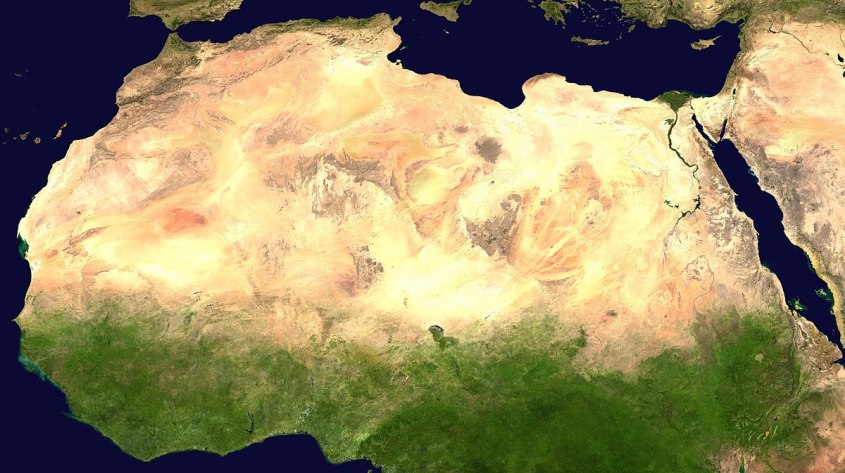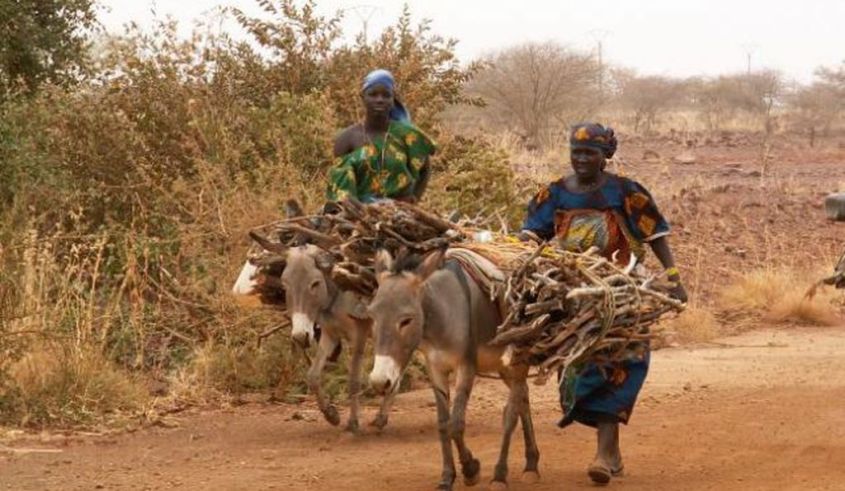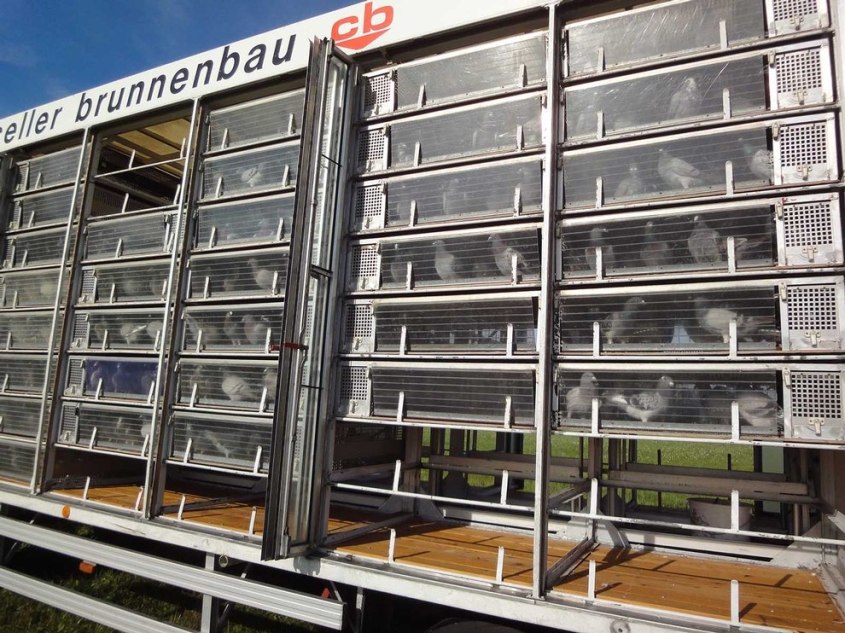and the lovers become an inseparable couple…
Regards and a good night from Venus
and the lovers become an inseparable couple…
Regards and a good night from Venus
When we talk about global warming, we are in the habit of only considering the damage that could affect the most developed countries, without considering that there are regions on the planet that are even more concerned with these issues:

In recent years, African countries have been suffering from increasing desertification, which is destroying their environmental resources. Fortunately, a new project is trying to save these countries: they call it “the great green wall“.
 The Great Green Wall is over 8000 km long
The Great Green Wall is over 8000 km long
The Great Green Wall is an African-led movement with the humble goal of building an 8,000 km long natural wonder across the entire width of Africa.
Already a decade later and around 15% in progress, the initiative is bringing unprecedented life back to the degraded landscapes of Africa, offering food security, jobs and a reason to stay for the millions of people who live on their way.
The wall promises a convincing solution to the many urgent threats to which not only the African continent but the entire world community are exposed – in particular climate change, drought, hunger, conflicts and migration.
 Millions of people are working to create the green wonder of the world.
Millions of people are working to create the green wonder of the world.
When completed, the Great Green Wall will be the largest living structure in the world, three times the size of the Great Barrier Reef.
The Great Green Wall takes root in the African Sahel region on the southern edge of the Sahara – one of the poorest places on earth.
The Sahel is at the forefront of climate change more than anywhere else on earth, and millions of locals are already facing the devastating effects.
Persistent droughts, food shortages, conflicts over dwindling natural resources and mass migration to Europe are just a few of the many consequences.
Communities from Senegal in the west to Djibouti in the east are resisting.
Since the initiative was founded in 2007, life has returned to the country and improved food security, jobs and the stability of people’s lives.
The project was an idea as early as 1952 when Richard St. Barbe Baker, an English environmental activist, suggested planting a significant number of trees in Sub-Saharan Africa to curb desertification in Africa.
The idea was reconsidered at the N’Djamena Summit in Chad in 2002 on the occasion of World Day Against Desertification and Drought and was presented and adopted in 2005 by the Saharawi and Sahara Heads of State and Government in Ouagadougou, Burkina Faso.

The program involves the development of an extensive green space (approximately 15 km wide and 8,000 km long) by planting millions of acacias, trees that are drought-resistant because their roots attract water.
The Green Wall has been approved, supported and co-financed by the African, Caribbean and Pacific Republic (ACP), the Food and Agriculture Organization of the United Nations (FAO) and the European Union.
This is a project of enormous importance, not only because it is a concrete fight against climate change, but also because it shows that humanity can still be united and fight for a common cause.
By 2030, the wall wants to restore 100 million hectares of currently degraded soil, bind 250 million tons of carbon and create 10 million jobs in rural areas.

Since its launch in 2007, major progress has been made in restoring the fertility of Sahelian lands. Key examples include:
https://www.unccd.int/actions/great-green-wall-initiative
My comment: I see the GREAT GREEN WALL project as an initiative of optimism, solidarity and determination that captures the zeitgeist of a unique moment and reveals the soul of a new African generation trying to take control of its own destiny.
Future music is not a utopia here, but rather the engine of hopeful people who mercilessly declare war on the destruction of climate change with a green thumb.
My best regards to all, Venus

The Association of German Pigeon Breeders is currently making renewed efforts to recognize racing pigeons as a national cultural heritage. The decision for or against admission is expected to be made in December 2020 jointly by the UNESCO Commission, the Conference of Ministers of Education and the Federal Government Commissioner for Culture and the Media.
Please ask the Kultusministerkonferenz and the German UNESCO Commission together with us NOT to include racing pigeons in the list of intangible cultural heritage.

Online petition ( https://www.peta.de/brieftaubensport-petition)*
Cruelty to animals is not a culture – carrier pigeons must not become a cultural heritage
Dear Sirs and Madames,
I am concerned to note that racing pigeons could be included in the nationwide list of intangible cultural heritage in 2020. Due to significant animal welfare aspects, I would like to ask you not to take this step.
As part of pigeon races, the animals are often required to achieve maximum performance that exceeds their strength. Pigeons who do not reach the goal or cannot find their way back to their home stroke have little chance of survival due to their conditioning on special food. In addition, they can contribute to the enlargement and thus the suffering of urban pigeon populations living in cities.
According to the breeders’ own information, the “losses” in pigeon races are 20 to 25 percent of the pigeons per season. Pigeon expert Dr. med. vet. Warzecha et al. even put loss rates of 53 percent on average in one study.
“Animal consumption” of this magnitude in the course of a hobby is highly unethical and should disqualify the pigeon races as a candidate for cultural heritage.

The animal welfare problem is a worldwide phenomenon: According to a study by the Swiss Animal Welfare Agency (STS), the loss rates for examined races in Switzerland are around 75 percent.
According to a report by the NRW authority LANUV (2019), “at least 50 percent of the pigeons delivered were lost during the settling-in and racing phase” during a flight season during a grandstand flight in North Rhine-Westphalia reported by PETA.
The breeders use the loyalty of the animals to their partner, their offspring and their home streak to ensure that pigeons achieve top performance when racing.

In this way, pairs of pigeons are deliberately separated from one another using the so-called “widower method”. The so-called “nest method” describes the separation of a parent from the partner and the already hatched offspring. Countless pigeons die annoyingly in the races each year due to dehydration, exhaustion or injuries.

Birds that fall short of breeders’ expectations and are unsuitable for further breeding are often killed without anesthesia. To do this, the breeders pull on the pigeon’s neck or turn the head of the animals until death occurs.
I very much hope for your renewed decision that racing pigeons are neither justifiable nor responsible in a modern society with moral principles and in a country in which animal welfare has a constitutional status – not even under the guise of “tradition”.
I would therefore ask you not to continue to include carrier pigeons in the nationwide list of intangible cultural heritage.
Sincerely yours
And I mean…For the races, the animals are transported from the criminal pigeon keeper hundreds to thousands of kilometers away from their home. They take advantage of the despair of their animals who want to fly back to their home and to their families as quickly as possible.
Many of these sensitive and loving animals die from lack of fluids, hunger, exhaustion or injuries during the long flights.
Those who are “lucky” and arrive alive end up on the street and feed on trash leftovers that often cause illness and death.

After all, how can anyone seriously come to the conclusion that such a criminal business should be protected as a “cultural heritage”?
And who is so mentally and morally carbage who wants to live in a society in which cruelty to animals is celebrated and held up as a cultural heritage?
On November 7, 2013, the Senate in Madrid put the bloody spectacle of bullfighting under special protection with a new law and declared it an “intangible cultural asset” (!!!).
Spain should be ashamed of it for eterna, and it will also be a shame for Germany if a similar bloody sport is recognized as a cultural heritage.
My best r egards to all, Venus

WAV comment – with global governments not having the guts to tell the Chinese to clean up their act when it comes to livestock wet markets and the terrible abuses which we see all the time in China; and for which the whole planet is now suffering; we actually have doubts that the debate in UK Parliament scheduled for 16/3 to end caged animal farming will actually take place – after all, is it not more important to debate how to control the virus than go back to the Chinese and inform them that their lack of legislation regarding animal welfare legislation is the whole reason for the planet now being up to its neck in virus controls and regulations ?
Gutless governments who do not really want to raise the underlying issue for all these problems with the Chinese – lets see what happens in UK Parliament on 16 March, and if the issue is debated. Or will Coronavirus; take precedent over everything else once again as it has done for weeks.
We will watch and report on the ‘yes’ or ‘no’ debate in the next few days.

This debate presents a historic opportunity to ramp up political pressure to end caged farming once and for all.
In March 2019 Viva! joined forces with animal protection organisations around the country to launch a parliamentary petition calling for an end to the cage age.
Over 16 million farmed animals are confined to cruel cages, in the UK, and unable to express many of their natural behaviours as a result. The response was overwhelmingly positive with more than 65,000 people signing the petition in its first two weeks. By securing over 107,000 signatures the petition triggered a parliamentary debate, which was unfortunately postponed due to the proroguing of Parliament in August 2019!
The government initially responded on 22 March 2019 by emphasising the successes of earlier campaign work to prohibit battery cages, sow stalls and veal crates, yet what they failed to recognise was the wealth of scientific evidence demonstrating how so-called ‘enriched cages’, farrowing crates and calf hutches continue to compromise welfare and are detrimental to the well-being of farmed animals.
Undercover investigators for Viva! Campaigns have filmed the shocking reality of our ‘high standards of husbandry’ time and time again, and urged the British public to Face Off against these industries. We’ve found between 40 to 80 egg-laying chickens crammed into cages that provide less than a postcard size of extra space than the banned battery cage; pigs confined to barren metal barred crates with little room to move forwards or backwards let alone turn around (much like the old sow stalls); and frightened unweaned calves, some well over the recommended eight weeks of age, housed alone in hard plastic hutches – many without ‘visual and tactile contact with other calves’.
The government’s disappointing response however came as no surprise when the current laws to protect farmed animals are few and far between. The regulatory system provides us no level of assurance and plans to increase the maximum penalty for animal cruelty from six months to five years leaves a lot to be desired when so many animal abusers walk free from court.
The petition will now finally be debated on 16 March 2020, presenting a historic opportunity to ramp up political pressure to end caged farming once and for all. Please call on your MP to join the debate and vote in favour of the ban!
The most powerful action you can take to end animal suffering, protect the environment and improve your health is to go vegan. For all the help and support you need to make the change see: viva.org.uk/easyvegan.